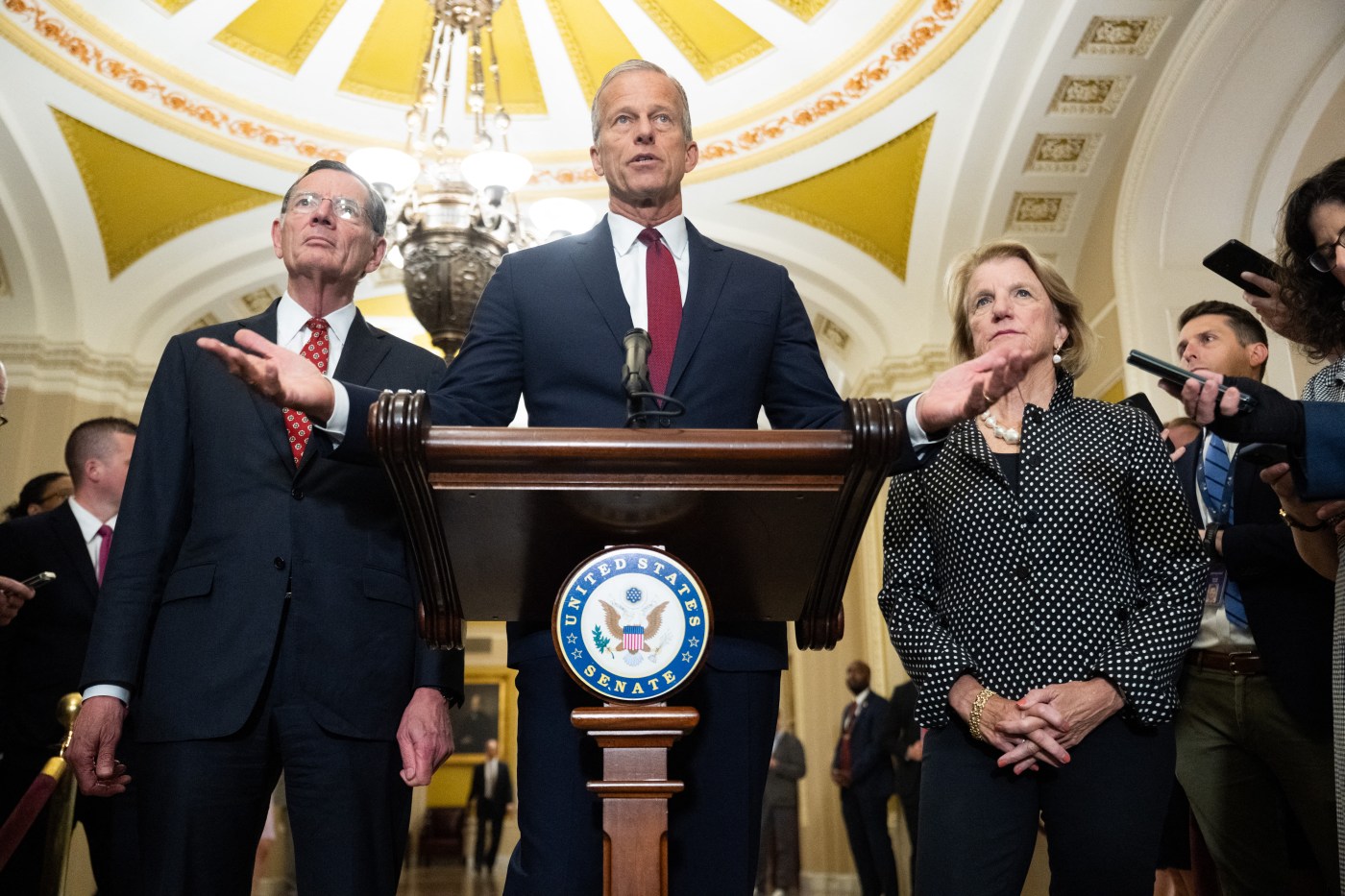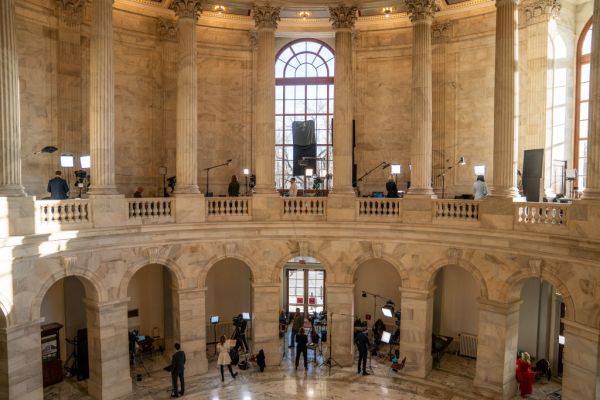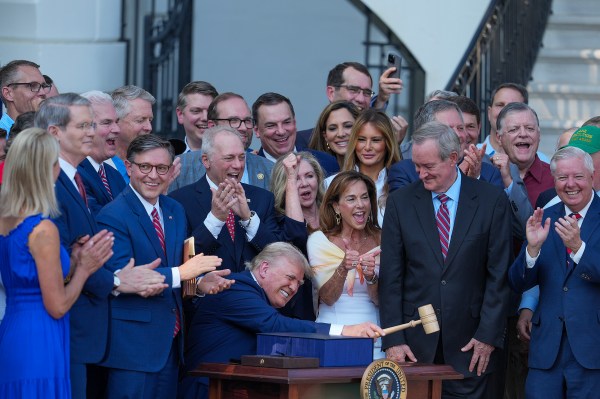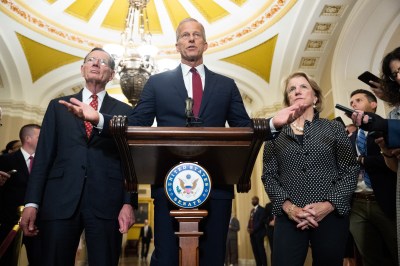Six-and-a-half months into the 119th Congress, it’s clear that the Senate has been the chamber to determine how and when legislation moves through the legislative branch—as well as what it looks like.
Just look at the major party-line legislation Congress has passed thus far. The prime example is the One Big Beautiful Bill Act. When the bill initially passed the House in May, it contained a ratio of spending cuts and tax cuts that both GOP leadership and House Republican hardliners could agree on. But when the Senate sent the bill back to the House three days before President Donald Trump’s July 4 deadline, that carefully negotiated framework had been blown up, with far fewer spending cuts than the House’s hardliners had wanted. The fiscal hawks voted for the Senate’s version anyway.
Or take the recently passed package of recissions demanded by the White House. The House passed its version more than a month before the statutory deadline of July 18, but the Senate, preoccupied with the OBBBA, did not get its amended version back until July 17. Republican senators had passed a package with almost $500 million less in spending cuts, including eliminating measures in the House version that would have cut global health programs that fight AIDS and HIV. Out of time, the House swallowed the Senate’s recissions package, too.
That’s twice in one month that the Senate has given the House amended legislation just days before Congress has to approve it, though not all House Republicans are complaining.
“I think it's the legislative process,” Rep. Kevin Hern of Oklahoma, a member of House leadership who serves as the head of the Republican Policy Committee, told The Dispatch. “We send over what we think should be in the bill, they send it back with what they think is in the bill. We work it out. We either agree and send it to the president or disagree and send it back to them.” He said he considered the OBBBA to be “85 to 90 percent our bill” when it came back from the Senate.
But fiscal hawks in the House do not share his opinion. “They jammed us,” Rep. Rich McCormick of Georgia said of the tax-cuts-and-spending bill. “That's why we passed what we passed. We didn't want to pass [the Senate’s version], but we didn't really have a choice, did we? [If] we kicked it back to the Senate, there's at least one senator who’s going to take their pound of flesh, and it would have been a worse bill. That's why we voted for it.”
In two months, Congress faces another legislative deadline, and once again the Senate is likely to control the process. The stopgap spending measure lawmakers passed in March to keep the government open expires at the end of September. Republicans’ goal is to finally pass all 12 appropriations bills through regular order, something the legislative branch has not done since 1997.
It’s a lofty goal, and it comes amid dissatisfaction from House hardliners over the way the Senate handled previous legislation, with Speaker Mike Johnson largely powerless over when the upper chamber gets bills to the other side of the Capitol. Rep. Eli Crane of Arizona recognized the possibility of something similar happening with the appropriations process. “It's just the way this place works,” he told The Dispatch. “Both bodies are constantly looking for leverage points.”
Appropriations committees in both chambers are working on the bills; the House has passed two, and the Senate is likely to pass the bill to fund military construction, veterans affairs, and related agencies this week. The House passed its version of that bill in late June, basically on a party-line vote. Senate Democrats thus far have not obstructed the upper chamber’s version of the bill, voting overwhelmingly to advance it toward consideration last week.
As one might guess from the vote results, the House version and the Senate version differ significantly, and the House will need to approve the amended version once it gets back from its August recess—another snag in getting appropriations passed in time.
Lawmakers generally spend the month of August in their own districts without meeting for legislative business. The House finished up last week, and the Senate will take a break after this week. Both chambers are also set to take off the week of September 22. That means once legislators get back after Labor Day, they will have just three full weeks in session before the funding deadline, and each chamber will have, at most, two of the 12 required bills passed. The best-case scenario appears to be the Senate giving the House a collection of bipartisan funding bills to which fiscally hawkish Republicans will probably object, with little time to negotiate.
Sen. Mike Rounds of South Dakota, a Republican on the Appropriations Committee, said he was not worried about the Senate dictating terms to the House.
“They understand that we're working ours on our schedule. They'll work theirs on their schedule,” he told The Dispatch. “We're here for another week. They're back home in their work location, so we can't wait for them. So they'll have to kind of kick it in gear, and I think they will. So, I'm not worried about that. There's been coordination between the chairmen already on the subcommittees, so we're a lot closer than we have been in some years in the past.”
What happens if Congress can not agree on the 12 bills before September 30? The alternative is another dreaded continuing resolution (CR), the type of stopgap spending measure that Congress has often relied on to fund the government. Lawmakers usually hate them because such resolutions generally extend current funding levels instead of tailoring discretionary spending to the present needs. House members have been bracing for a CR.
Rep. Andy Harris of Maryland, chair of the CR-hating Freedom Caucus, expressed support for a one-year measure last week. “A funding freeze in a setting of 2.7 percent inflation actually is a real cut in the size and scope of government and resets the [Congressional Budget Office] baseline,” he said. But not all hardliners are happy about the possibility. Rep. Marjorie Taylor Greene of Georgia said she would not vote for a CR, as did McCormick.
“Chances are, we're probably going to end up with a CR. Now, that's going to be a problem for me because I’ve vowed not to vote for a CR. And I mean it. I really think that would be the worst possible thing we do,” McCormick told The Dispatch.
Of course, if the Big Beautiful Bill taught us anything, it’s that the House hardliners are known to cross the red lines they set. After all, that’s the likely reason why the Senate has jammed them.
Julian Hill contributed to this report.







Please note that we at The Dispatch hold ourselves, our work, and our commenters to a higher standard than other places on the internet. We welcome comments that foster genuine debate or discussion—including comments critical of us or our work—but responses that include ad hominem attacks on fellow Dispatch members or are intended to stoke fear and anger may be moderated.
With your membership, you only have the ability to comment on The Morning Dispatch articles. Consider upgrading to join the conversation everywhere.